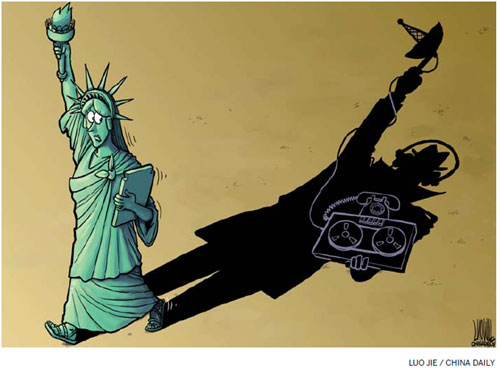

It is a symbol of its soft power and protected by the First Amendment, but press freedom in the US has been compromised. Often extolled as "sacred and inviolable", the US advocacy of press freedom has proven hypocritical.
The People's Daily on Tuesday quoted a report published by the New York-based Committee to Protect Journalists, which concludes that the recent information leakage probe conducted by the US government and its surveillance agencies on some journalists have posed a real threat to the concept of press freedom.

Gary Pruitt, CEO of Associated Press, recently filed a protest against the US government's clandestine acquisition of phone communication records of more than 100 AP journalists.
The US government has tightened press regulations since the 9/11 terrorist attacks in the name of national interest and fighting terrorism. That was hardly an unexpected consequence.
However, the information disclosed by Edward Snowden, a former contractor of the US National Security Agency, on pervasive US surveillance indicates the US national interest and its anti-terror war are just two baskets in which anything can be placed. Press freedom has been a convenient victim mugged under the cover of fighting terror.
Even in their daily news coverage, the US media have felt the "invisible hand" of Washington.
An editor with The New York Times once leaked that the White House press secretary will notify the media if the president does not want a certain matter to hit the headlines. A media outlet that defies this instruction will be, at the very least, shunned. This could range from being denied a chance to have a breakfast meeting with the president or receive no reply to an application to have an interview with the president, to something far more serious.
The US government has never kept its hands clear of the media. It offers concocted news to favored outlets and exerts non-disguised surveillance and intervention.
A report disclosed by Edward Snowden reveals that about one-third of the world's international long-distance calls are transferred via the US or its agencies, and almost all Internet communications are stored and may be examined by its surveillance apparatus.
The US has strengthened its control over the media and, at the same time, advocates press freedom which it trumpets as part of its soft power to boost its international reputation. For those who have been longing for US-style press freedom, the CPJ's report and the AP executive's protest should act as a wake-up call.
One of the reasons why Washington has been so intent on imparting its idea of press freedom to other countries is to add to its political weight and present to the outside world its institutional superiority. However, such a sense of superiority, combined with its overpowering economic and military muscle, will make it even more commonplace for the US to act with impunity in its dealings with international community.
(China Daily 10/24/2013 page9)